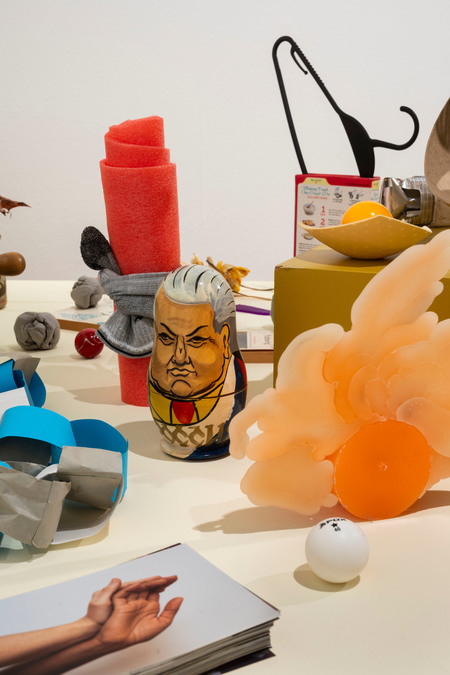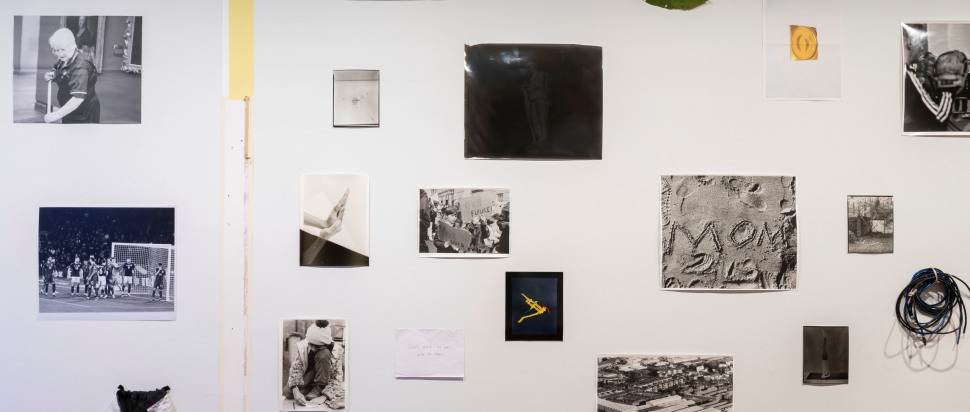Margaret Salmon: Assembly @ Hunterian, Glasgow
Artist-filmmaker Margaret Salmon compellingly examines the impact of austerity on Glasgow communities through an evolving installation at The Hunterian
Margaret Salmon’s latest exhibition is a sprawling work-in-progress that straddles the personal and universal in a quietly political reflection on community and collaboration. The Glasgow-based artist filmmaker is known for her socially conscious art which remains deftly rooted in the minutiae of the personal everyday. Her guiding question of how years of austerity and a global pandemic have affected individuals and community in Glasgow is an ambitious one, though she is under no illusion that such a question can ever be answered entirely – not least in a single exhibition.
Assembly begins in The Hunterian’s winding stairwell, where patchwork duvets hang as if drying outside the gallery’s teeming exhibition room. As symbols of domesticity, they lead visitors into a space that promises comfort in familiarity as much as it probes our individual experiences of the everyday. A plaster table opposite the entrance is shrouded in a miscellany of seemingly arbitrary objects: paper chains, worn-out trainers, a coconut, an enamel cat button and a quarter-full tube of ‘pineapple haze hand and foot cream’, to name a few. A pile of The Herald newspapers underneath the table point to a wider social reality that (literally) underlies the hyper-subjective collection of ephemera atop it. A closer look at that collection reveals some of the politics of this exhibition in a copy of E.J. Mishan’s The Costs of Economic Growth (1967).
Mishan’s critique of growth-focused economic policies remains especially pertinent while stories of environmental collapse and technological warfare constitute the daily newsreel. Salmon, however, is careful not to make these stories the centre of the exhibition, perhaps because choosing just one assumes an artistic authority that she seems keen to reject. Instead, she gestures towards them in printed screenshots tacked amongst a busy collage that extends from floor-to-ceiling along the room’s largest wall. Unframed black and white photographs make up the most part of this collage, some still creased as if just unfolded from a family’s storage box. This found-art approach, carried throughout the exhibition, heightens the intimacy of some of the most personal photographs and begins an ethnography of the Kelvinside and Maryhill communities who are the central collaborators of Salmon’s project.

The work of one Maryhill artist, Jo Sunshine, hangs to the right of the entrance. It is a vibrant oil pastel drawing of a herring, outlined in block black lines and coloured in shades of violet and electric purple. Sunshine’s maximalist use of colour is fitting for an exhibition that shirks conventional approaches towards curation and display; the absence of negative space, frames or labels has a democratising effect that invites collaboration rather than presenting the exhibition as complete in any way. This open-endedness might be overwhelming if not for the collection of short films that hold the exhibition together.
Totalling over an hour long, the clips cast a gentle lens on the people whose often invisible work sustains culture and creativity in the city. In one, Salmon presents a portrait of Anne McInally, a cleaner at The Hunterian. Salmon keeps her questions light, allowing McInally to discuss the market of ostrich feather dusters, while letting the quiet scenes of her dusting Mackintosh furniture and sweeping under the Rubens testify to the necessity of her labour. It is labour like hers that facilitates the inspiration which begets art like local musician Pippa Blundell, whose ethereal performance of Gaps begins the series of shorts.
With an accompanying 35mm feature film in the works, and an intention to expand the installation over time, Assembly is a compelling argument for the endurance of art in an age of austerity. After collective loss comes collective (re)imagining. Assembly is unique in its insistent citation of the quotidian labour, spaces and tools that facilitate that process of re-imagining.
Margaret Salmon: Assembly, The Hunterian, Glasgow, until 19 Oct. Open daily, 10am-5pm
